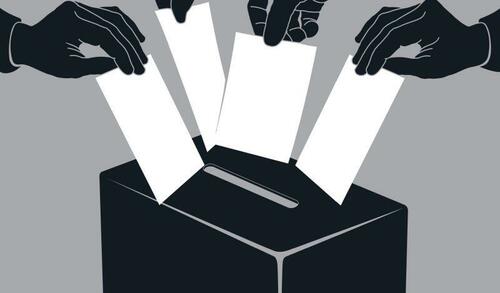
Throughout this election cycle, we have witnessed an incessant assault on our First Amendment.
The regime sent dissidents to prison, destroyed opposition news sites, colluded to control the free flow of information, bankrupted its critics, and boasted that it would criminalize “misinformation.”
The election threatens the death knell for free expression in the United States as Kamala Harris and her lead attorney, Marc Elias, vow to punish anyone who questions their pursuit of power.
No political actor has been more influential in overturning election integrity efforts than Marc Elias. Recently, he led the crusade to overturn the Wisconsin Supreme Court’s 2022 ruling in Teigen v. Wisconsin Elections Commission, which banned the use of “drop boxes” in the state.
In deciding whether to hear the case, Republican Justice Rebecca Bradley called the Elias-led litigation a “shameless effort to readjust the balance of political power in Wisconsin.” Elias was successful, and dropboxes are now taking votes in Wisconsin, a state that may be the tipping point in the election.
In 2020, President Biden won Wisconsin by just 20,000 votes. The rejection rate for absentee ballots plummeted from 1.4% to 0.2% as 1.9 million of the state’s 3.3 million voters cast absentee ballots.
Similarly, Elias led lawsuits to defend dropboxes in Pennsylvania. In 2020, President Biden received 75% of the 2.5 million mail-in ballots and won the state by under 100,000 votes.
But temporary political victories are insufficient for Elias. Along with Project 65, Elias has called for the disbarment of attorneys who challenge him in court. “I don’t think any lawyer should have a bar license for the privilege of destroying our country’s democratic traditions,” Elias insists, though “democratic traditions” apparently means months of absentee voting without signature verification or photo identification. He demanded an “accountability structure” for those who challenge the Democrats’ mandated standards for a “free and fair election.”
Harris and her running mate, Tim Walz, evidently share this intolerance for dissent. Walz has insisted that the First Amendment does not protect “misinformation or hate speech…especially around our democracy.” The Biden-Harris administration has fiercely championed censorship and the regulation of social media content.
Now, they threaten to jail anyone who criticizes their pursuit of power. Their judges – likely to be in the mold of Ketanji Brown Jackson – will not let the First Amendment “hamstring” their efforts to reshape the American government. And perhaps most tellingly, they’ll censor the critiques that are most obviously true.
“Absentee ballots remain the largest source of potential voter fraud.”
–Jimmy Carter, 2005
We have long known the threat that absentee ballots pose to our elections. Following the controversy of the 2000 Presidential election, the United States formed a bipartisan Commission on Federal Election Reform. President Jimmy Carter, a Democrat, and former Secretary of State James Baker, a Republican, chaired the group.
After almost five years of research, the group published its final report – “Building Confidence in U.S. Elections.” It offered a series of recommendations to reduce voter fraud, including enacting voter-ID laws and limiting absentee voting. The commission was unequivocal: “Absentee ballots remain the largest source of potential voter fraud.” Yet, Elias and Harris would gladly disbar any attorney who uttered such a sentence in court.
The report continued: “Citizens who vote at home, at nursing homes, at the workplace, or in church are more susceptible to pressure, overt and subtle, or to intimidation. Vote buying schemes are far more difficult to detect when citizens vote by mail.”
Recent history supports this thesis. Just last week, a Chinese national illegally voted in Michigan. He was only caught because he brought it to the attention of authorities, who later revealed that his vote (though admittedly invalid) will still count.
The 1997 Miami mayoral election resulted in 36 arrests for absentee ballot fraud. A judge voided the results and ordered the city to hold a new election due to “a pattern of fraudulent, intentional, and criminal conduct.” The results were reversed in the subsequent election.
Following Dallas’s 2017 City Council race, authorities sequestered 700 mail-in ballots signed “Jose Rodriguez.” Elderly voters alleged that party activists had forged their signatures on their mail-in ballots. Miguel Hernandez later pled guilty to the crime of forging their signatures after collecting unfilled ballots and using them to support his candidate of choice.
The following year, it appeared that Republican Mark Harris defeated Democrat Dan McCready in a North Carolina Congressional race. Election officials noticed irregularities in the mail-in votes and refused to certify the election, citing evidence and “claims of…concerted fraudulent activities.” The state ordered a special election the following year.
In 2018, the Democratic National Commission challenged an Arizona law that set safeguards around absentee voting, including limiting who could handle mail-in ballots. US District Judge Douglas L. Rayes, an Obama appointee, upheld the law.
“Indeed, mail-in ballots by their very nature are less secure than ballots cast in person at polling locations,” he wrote.
He found that “the prevention of voter fraud and preservation of public confidence in election integrity” were important state interests and cited the Carter-Baker Commission’s finding that “Absentee ballots remain the largest source of potential voter fraud.”
In May 2020, New Jersey held municipal elections and required all voting take place via mail due to Covid. The State’s third largest city, Paterson, held its election for City Council. Election officials rejected 19% of the ballots from Paterson, a city with over 150,000 residents. While Paterson’s election was particularly troublesome, mail-in ballots were problematic across the state. Thirty other New Jersey municipalities held vote-by-mail elections that day, and the average disqualification rate was 9.6%.
New Jersey brought voting fraud charges against City Councilman Michael Jackson, Councilman-Elect Alex Mendez, and two other men for their “criminal conduct involving mail-in ballots during the election.” All four were charged with illegally collecting, procuring, and submitting mail-in ballots.
A state judge later ordered a new vote, finding that the May election “was not the fair, free and full expression of the intent of the voters. It was rife with mail in vote procedural violations constituting nonfeasance and malfeasance.”
In Wisconsin, the April 2020 primary election offered further evidence of the challenges and corruption surrounding mail-in voting. Following the primary, a postal center outside Milwaukee discovered three tubs of absentee ballots that never reached their intended recipients. Fox Point, a village outside Milwaukee, has a population of under 7,000 people.
Beginning in March, Fox Point received between 20 and 50 undelivered absentee ballots per day. In the weeks leading up to the election, the village manager said that increased to between 100 and 150 ballots per day. On Election Day, the town received a plastic mail bin with 175 unmailed ballots. “We’re not sure why this happened,” said the village manager. “Nobody seems to be able to tell me why.”
Democrats admitted the system threatened election integrity. “This has all the makings of a Florida 2000 if we have a close race,” said Gordon Hintz, the Democratic minority leader in the Wisconsin State Assembly. New York Governor Andrew Cuomo went further. “It’s a harder system to administer, and obviously it’s a harder system to police writ large,” he said. Cuomo continued, “People showing up, people actually showing ID, is still the easiest system to assure total integrity.”
The Wisconsin primary also featured special elections for the Wisconsin Supreme Court. A liberal judge upset the incumbent conservative justice, and partisans embraced their overhaul of the electoral system. The New York Times reported: “Wisconsin Democrats are working to export their template for success – intense digital outreach and a well-coordinated vote-by-mail operation – to other states in the hope that it will improve the party’s chances in local and statewide elections and in the quest to unseat President Trump in November.”
Scores of other reports of election fraud came forward as the Democratic Party used the pretext of Covid to reshape American elections. Despite the corruption, lost ballots, and admitted threats to electoral integrity, the process had been a success in political terms; their candidate had won. The ends had justified the means. Citizens lost faith in their election process, and political leaders readily admitted that their concerns were justified; but the professional politicos and their mouthpiece, the New York Times, characterized the disaster as a “template for success.”
The stakes of the election could not be more stark. We either remain free to criticize those who reign over us, or we surrender this nation to a cabal of censorious thugs who will remain insatiable in their pursuit of ever-more power.
Throughout this election cycle, we have witnessed an incessant assault on our First Amendment.
The regime sent dissidents to prison, destroyed opposition news sites, colluded to control the free flow of information, bankrupted its critics, and boasted that it would criminalize “misinformation.”
The election threatens the death knell for free expression in the United States as Kamala Harris and her lead attorney, Marc Elias, vow to punish anyone who questions their pursuit of power.
No political actor has been more influential in overturning election integrity efforts than Marc Elias. Recently, he led the crusade to overturn the Wisconsin Supreme Court’s 2022 ruling in Teigen v. Wisconsin Elections Commission, which banned the use of “drop boxes” in the state.
In deciding whether to hear the case, Republican Justice Rebecca Bradley called the Elias-led litigation a “shameless effort to readjust the balance of political power in Wisconsin.” Elias was successful, and dropboxes are now taking votes in Wisconsin, a state that may be the tipping point in the election.
In 2020, President Biden won Wisconsin by just 20,000 votes. The rejection rate for absentee ballots plummeted from 1.4% to 0.2% as 1.9 million of the state’s 3.3 million voters cast absentee ballots.
Similarly, Elias led lawsuits to defend dropboxes in Pennsylvania. In 2020, President Biden received 75% of the 2.5 million mail-in ballots and won the state by under 100,000 votes.
But temporary political victories are insufficient for Elias. Along with Project 65, Elias has called for the disbarment of attorneys who challenge him in court. “I don’t think any lawyer should have a bar license for the privilege of destroying our country’s democratic traditions,” Elias insists, though “democratic traditions” apparently means months of absentee voting without signature verification or photo identification. He demanded an “accountability structure” for those who challenge the Democrats’ mandated standards for a “free and fair election.”
Harris and her running mate, Tim Walz, evidently share this intolerance for dissent. Walz has insisted that the First Amendment does not protect “misinformation or hate speech…especially around our democracy.” The Biden-Harris administration has fiercely championed censorship and the regulation of social media content.
Now, they threaten to jail anyone who criticizes their pursuit of power. Their judges – likely to be in the mold of Ketanji Brown Jackson – will not let the First Amendment “hamstring” their efforts to reshape the American government. And perhaps most tellingly, they’ll censor the critiques that are most obviously true.
“Absentee ballots remain the largest source of potential voter fraud.”
–Jimmy Carter, 2005
We have long known the threat that absentee ballots pose to our elections. Following the controversy of the 2000 Presidential election, the United States formed a bipartisan Commission on Federal Election Reform. President Jimmy Carter, a Democrat, and former Secretary of State James Baker, a Republican, chaired the group.
After almost five years of research, the group published its final report – “Building Confidence in U.S. Elections.” It offered a series of recommendations to reduce voter fraud, including enacting voter-ID laws and limiting absentee voting. The commission was unequivocal: “Absentee ballots remain the largest source of potential voter fraud.” Yet, Elias and Harris would gladly disbar any attorney who uttered such a sentence in court.
The report continued: “Citizens who vote at home, at nursing homes, at the workplace, or in church are more susceptible to pressure, overt and subtle, or to intimidation. Vote buying schemes are far more difficult to detect when citizens vote by mail.”
Recent history supports this thesis. Just last week, a Chinese national illegally voted in Michigan. He was only caught because he brought it to the attention of authorities, who later revealed that his vote (though admittedly invalid) will still count.
The 1997 Miami mayoral election resulted in 36 arrests for absentee ballot fraud. A judge voided the results and ordered the city to hold a new election due to “a pattern of fraudulent, intentional, and criminal conduct.” The results were reversed in the subsequent election.
Following Dallas’s 2017 City Council race, authorities sequestered 700 mail-in ballots signed “Jose Rodriguez.” Elderly voters alleged that party activists had forged their signatures on their mail-in ballots. Miguel Hernandez later pled guilty to the crime of forging their signatures after collecting unfilled ballots and using them to support his candidate of choice.
The following year, it appeared that Republican Mark Harris defeated Democrat Dan McCready in a North Carolina Congressional race. Election officials noticed irregularities in the mail-in votes and refused to certify the election, citing evidence and “claims of…concerted fraudulent activities.” The state ordered a special election the following year.
In 2018, the Democratic National Commission challenged an Arizona law that set safeguards around absentee voting, including limiting who could handle mail-in ballots. US District Judge Douglas L. Rayes, an Obama appointee, upheld the law.
“Indeed, mail-in ballots by their very nature are less secure than ballots cast in person at polling locations,” he wrote.
He found that “the prevention of voter fraud and preservation of public confidence in election integrity” were important state interests and cited the Carter-Baker Commission’s finding that “Absentee ballots remain the largest source of potential voter fraud.”
In May 2020, New Jersey held municipal elections and required all voting take place via mail due to Covid. The State’s third largest city, Paterson, held its election for City Council. Election officials rejected 19% of the ballots from Paterson, a city with over 150,000 residents. While Paterson’s election was particularly troublesome, mail-in ballots were problematic across the state. Thirty other New Jersey municipalities held vote-by-mail elections that day, and the average disqualification rate was 9.6%.
New Jersey brought voting fraud charges against City Councilman Michael Jackson, Councilman-Elect Alex Mendez, and two other men for their “criminal conduct involving mail-in ballots during the election.” All four were charged with illegally collecting, procuring, and submitting mail-in ballots.
A state judge later ordered a new vote, finding that the May election “was not the fair, free and full expression of the intent of the voters. It was rife with mail in vote procedural violations constituting nonfeasance and malfeasance.”
In Wisconsin, the April 2020 primary election offered further evidence of the challenges and corruption surrounding mail-in voting. Following the primary, a postal center outside Milwaukee discovered three tubs of absentee ballots that never reached their intended recipients. Fox Point, a village outside Milwaukee, has a population of under 7,000 people.
Beginning in March, Fox Point received between 20 and 50 undelivered absentee ballots per day. In the weeks leading up to the election, the village manager said that increased to between 100 and 150 ballots per day. On Election Day, the town received a plastic mail bin with 175 unmailed ballots. “We’re not sure why this happened,” said the village manager. “Nobody seems to be able to tell me why.”
Democrats admitted the system threatened election integrity. “This has all the makings of a Florida 2000 if we have a close race,” said Gordon Hintz, the Democratic minority leader in the Wisconsin State Assembly. New York Governor Andrew Cuomo went further. “It’s a harder system to administer, and obviously it’s a harder system to police writ large,” he said. Cuomo continued, “People showing up, people actually showing ID, is still the easiest system to assure total integrity.”
The Wisconsin primary also featured special elections for the Wisconsin Supreme Court. A liberal judge upset the incumbent conservative justice, and partisans embraced their overhaul of the electoral system. The New York Times reported: “Wisconsin Democrats are working to export their template for success – intense digital outreach and a well-coordinated vote-by-mail operation – to other states in the hope that it will improve the party’s chances in local and statewide elections and in the quest to unseat President Trump in November.”
Scores of other reports of election fraud came forward as the Democratic Party used the pretext of Covid to reshape American elections. Despite the corruption, lost ballots, and admitted threats to electoral integrity, the process had been a success in political terms; their candidate had won. The ends had justified the means. Citizens lost faith in their election process, and political leaders readily admitted that their concerns were justified; but the professional politicos and their mouthpiece, the New York Times, characterized the disaster as a “template for success.”
The stakes of the election could not be more stark. We either remain free to criticize those who reign over us, or we surrender this nation to a cabal of censorious thugs who will remain insatiable in their pursuit of ever-more power.
Loading…




